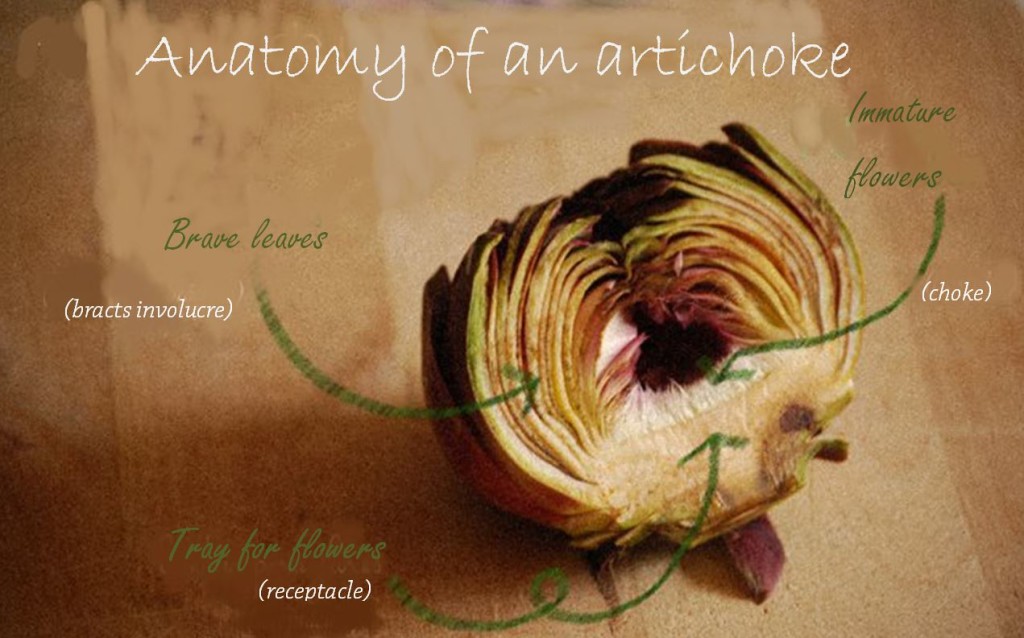Besides cooking non-stop, the quotidian cooks like to engage in philosophical discussions … about artichokes. For us there is no other vegetable so appealing and enigmatic at the same time. Will this be because it is indeed a flower? Or because it is the only vegetable that does not get on well with a red wine?
The metaphysical painter Giorgio de Chirico, to whom this post is dedicated, included artichokes in his paintings. Art connoisseurs have written pages and pages about the symbolism of De Chirico’s artichokes; we kind of disagree: De Chirico was born in Volos, a greek port, of italian parents and lived in Greece until he was 18. We suspect that the artichokes in his paintings were a way to bring him back to the Mediterranean, to the flavours of a dish of artichokes marinated in mint, lemon, olive oil and garlic (today’s recipe: Yum!).
Let’s have a closer look at them:
Photography adapted from Aina Erice’s article: Alcachofa: Breve Monografía Gastronómico-cultural. A. Erice 2015. Published in the blog: Historia de la Cocina y la Gastronomía.
In any case, we quotidians did not argue about art but on how to protect ourserves from pesticides, yup! The artichoke is well armored, but will the chemicals have penetrated its protective layers? To dissipate any doubts we can buy organic artichokes but buying everything organic is neither easy nor cheap. What we need is a shopper’s guide telling us which vegetables are loaded with pesticides in order to buy them organic and which ones can be bought from conventional farming. And we know one, the great The Dirty Dozen, though valid in the USA only. But, what about Europe or other parts of the world?
So, after some mental struggle the quotidian cooks have set to work and are going to elaborate a guide for Europe with products to be avoided and those with less pesticides. Stay tuned to our upcoming posts.
And in the meanwhile? Well, let’s rinse well the pesticides from the artichokes, oh! and from the mint leaves. And the lemon? No, the lemon must be organic because we will use the whole rind. A thorough wash of artichokes or any other vegetable assures us to clean up to 65 per cent of many chemicals which may be present after fumigation. Follow the directions in our recipe.
This is a very simple recipe, since once the artichokes are prepared we just need to put all ingredients in a casserole and cooke them together. Like this:
Artichokes are an important source of vitamins and soluble fiber. Check this link to see their detailed properties. Its most essential component is cynarine, a powerful antioxidant.
These artichokes keep all their flavor, accompanied by the essence of the lemon and the mint’s freshness. This is a very mediterranean dish we love to serve as an appetizer. The only bad news is that cynarine inhibits the taste receptors and after eating artichokes water or any other drinks taste sweet. We are sorry, but a red wine will not work here. Maybe a cava or prosecco? And a manzanilla (dry sherry wine)? But that’s another story.
- 12 fresh artichokes, small (baby) or medium sized
- 1 organic lemon
- 1 organic garlic clove
- 1 sprig of fresh mint (menta piperita)
- 1 red or green chile (optional)
- 100 ml. Extra virgin olive oil
- Salt and pepper
- Peel the lemon keeping the rind in one piece
- Prepare a large bowl with water and the juice of the lemon.
- Peel the artichokes leaving the hearts clean with the inner tender leaves as shown in the post picture.
- Place the artichoke hearts in the bowl with the sprig of mint and leave them soaking for 20 min.
- Rinse several times and dry the water out using a salad spinner.
- Arrange the artichokes at the bottom of your pan with the tails upwards (see picture).
- Add salt and pepper and add the garlic clove, lemon rind, mint, and chile (if used) among the vegetables.
- Add olive oil and the same amount of water (until the artichokes are covered half size by the liquids).
- Cover with the lid and simmer gently for 20 minutes.
- Serve this dish dressing the plate with the cooking juice. It is scrumptious!
In this case, we are soaking them for 20 min. to clean off pesticide residues. This method can rinse uo to a 65% of residues.
The chile adds a nice kick to the sauce obtained. If you are too sensitive you just avoid it.
You may serve the artichokes warm after cooked or cold as an appetizer. In any case they are fragrant, tender and very tasty.














Very useful. This website just keeps me coming back. Generally there s definitely not a lot otherwise to state regarding it :-p thanks a bunch.
Thanks so much. Please keep checking (or subscribe to receive our recipes and articles). We just posted a new one today.